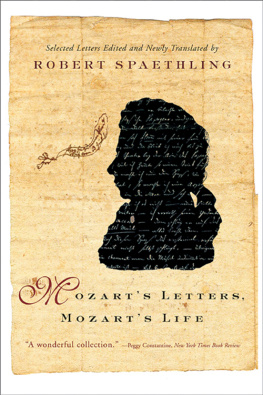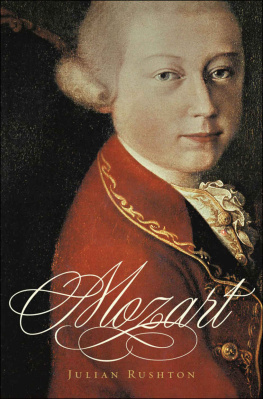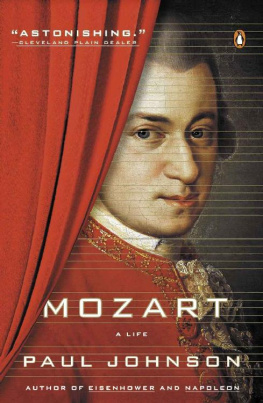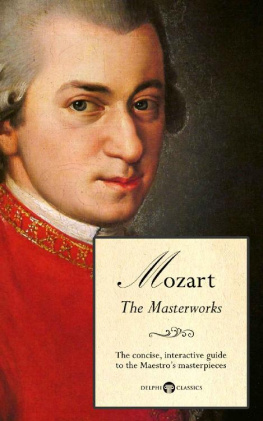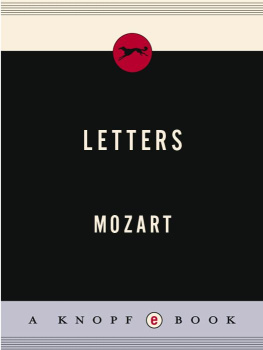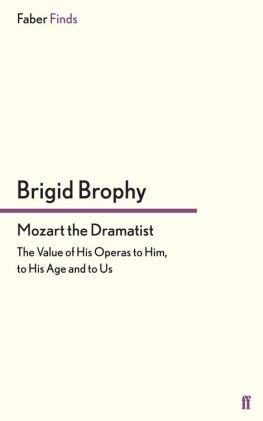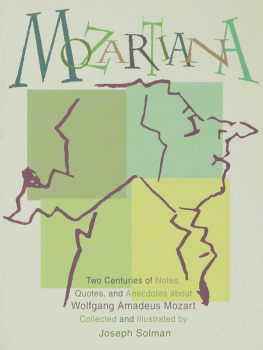
In memory of Stephen
CONTENTS
Prelude


A T THE end of the 1820s, three elderly widows lived in two separate households in Salzburg. One of them, bedridden and blind, led an almost reclusive existence in a third-floor apartment in Sigmund-Haffnergasse (whose back windows overlooked, had she been able to see them, those of the house in Getreidegasse where she had been born). The other two, sisters whose lives had converged again after the deaths of their husbands, enjoyed marvellous mountain views from their house and garden in the Nonnberggasse, a narrow street running along the cliff under the shadow of Salzburgs fortress. Between them, these women had shared, witnessed and contributed to the life of the greatest musical genius the world has ever known, Wolfgang Amadeus Mozart.
Although much of the story of Mozart, and of the women in his life, took place elsewhere, it is in the town of Salzburg that it begins, episodically continues, and ultimately (posthumously) ends. He himself was born there on 27 January 1756. He was the last of seven children, of whom only he and his sister Maria Anna (known as Nannerl) survived, born to Leopold and Maria Anna Mozart. At a very early age Wolfgangs phenomenal musical gifts were recognized by his parents, and much of his childhood was spent travelling through the major cities and capitals of Europe, where the small child played, composed and grew. His sister too was musically gifted, so at first the whole family travelled together, parading the two children on more or less equal terms. Later, when Nannerl approached adulthood, the women were left behind in Salzburg.
Yet despite the dazzling distribution of young Wolfgangs talents, and for all that his brilliance was universally recognized and praised, he could secure no permanent employment in any of the places he visited. He returned to Salzburg in his late teens, and joined his father in the musical service of its Prince-Archbishop. At the age of twenty-one he undertook another long journey in search of more stimulating employment, this time accompanied by his mother. But this trip resulted only in disaster, and yet again Wolfgang found himself back in Salzburg, where he felt trapped and unappreciated. During a temporary residence in Vienna, still in the service of his Salzburg Archbishop, he allowed himself to be ignominiously dismissed from his employment, and so entered the wholly precarious world of life as a freelance musician. But by now he had made many excellent contacts with musical patrons and friends, and for the next decade he poured his music into the opera houses, concert halls and musical salons of the Austrian capital. He married Constanze Weber, from another gifted musical family, and she bore him several children, of whom, again, only two survived. But the monumental achievements of the 1780s actually occurred against a backdrop of endless struggle, hardship and loss: the young couple were regularly short of money. By the time Wolfgangs fortunes were recovering, in 1791, his never-robust health had collapsed. He died in Vienna in December 1791, at the age of thirty-five.
In the years after Mozarts death, his widow Constanze, supported continually by her mother and sisters, gradually began to organize his musical legacy, arranging performances and publications. In 1809 she remarried. Her second husband, Georg Nissen, was a Danish diplomat, and in 1810 she returned with him to Copenhagen where they lived for ten years. On his retirement in 1820 they moved to Salzburg, for Nissen was undertaking the first major biography of Mozart. He died in 1826 before finishing it, but Constanze saw it into publication. She lived out the rest of her life in Salzburg, where she was treated with the greatest respect: at last, in the mid-nineteenth century, the town was beginning to appreciate the extraordinary genius it had raised, and lost. Constanzes gentle dignity and her quietly civilized lifestyle were noted by her visitors. She shared her last years with her younger sister Sophie, by then also widowed, and later still, in the 1830s, with her one remaining older sister Aloysia, whom, as it happened, Mozart had loved before he married Constanze.
Mozarts sister Nannerl, meanwhile, had been largely concerned with domestic responsibilities since her retreat from her brothers limelight. In 1784, at the relatively late age of thirty-three, she had married a much older widower, Johann Baptist Franz von Berchtold zu Sonnenburg, moved to St Gilgen where he was Prefect, and acquired five stepchildren. Only after the death of her brother in 1791 did she filter back into the Mozart narrative, supplying early memories and anecdotes to biographers. When her husband died in 1801, she returned to live in Salzburg, supporting herself and her own children by giving piano lessons, until her failing eyesight and physical frailty prevented this. She outlived her brother by nearly forty years.
And so, at the end of their lives, the women who had been closest to Mozart were all back in the town of his birth, observing caring courtesies in their communications with one another. In fact they head a whole roster of women who inspired, fascinated, supported, amused, aroused and sometimes hurt Mozart throughout his life. And since he was the creator of some of the most vividly drawn and brilliantly understood women on the operatic stage, his entire rich female acquaintance bears close examination.

T HIS CONCENTRATION ON women by no means ignores the importance to Mozart of male company and friendship. He was naturally gregarious, and from his childhood quite at ease in any company, whether in an Imperial palace or his local inn. His closest friends were often fine musicians too the clarinettist Anton Stadler, the violinist Franz Hofer (who married Mozarts sister-in-law Josefa Weber), and of course Joseph Haydn. With all these and many others, Mozart enjoyed a warm camaraderie, which embraced both profundity and buffoonery. He liked male clubs, societies and fraternities, and became a Freemason in his late twenties. And the most important single influence in his life was his father Leopold, in whose company he spent practically every day of his first twenty-one years. The relationship between father and son was highly complex, and deteriorated distressingly after Wolfgang escaped his fathers daily scrutiny. Ultimately the remarkable Leopold Mozart emerges as a tyrannical and paranoid man, who did and said unforgivable things to his son. But the bond between them was based on deep love and shared experience of travel and music. Leopolds death in 1787 was a major loss to Wolfgang, from which he never really recovered.
Mozarts large and diverse circle of female acquaintance similarly included many extremely talented musicians singers and instrumentalists with whom he enjoyed that most fulfilling experience, artistic collaboration. But beyond that, he turned unfailingly to women for support: for the whispering of confidences and the baring of his soul, for playful release from the mental and emotional pressures of constant creativity, for the boisterous normality of a domestic hurly-burly, and for the physical joy and comfort of sexual relations. Much of his attitude to women, his respect, his sympathy, his perspicacious understanding, can be gleaned from his music. And then there are the letters from him, to him, and about him. The surviving material inevitably has many gaps in it, some of extremely eloquent significance. Nevertheless it is a rich source of information, which in the case of Mozarts own letters offers insights too into his compositions. He was as fluent and inventive with words as he was with music. His letters have pace, narrative, dramatic contrast and great passion. At times they seem to be verbal equivalents of his famed improvisations at the keyboard: he could take an idea (be it descriptive, or practical, or even scatological), and develop it with fantastical imagination. He loved jokes and puns and ciphers, and often wrote in a veritable counterpoint of languages.
Next page


